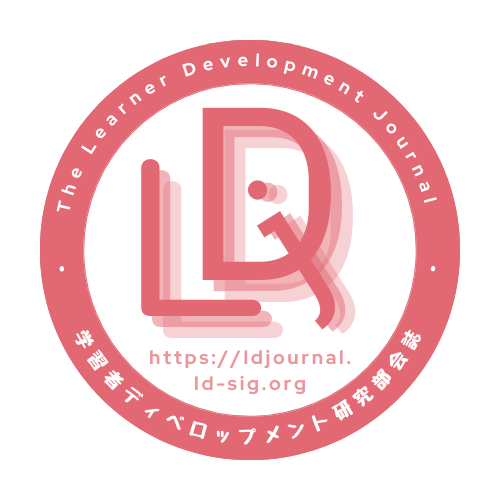July 2023

The co-editors are jointly responsible for tendering a proposal for an issue of The Learner Development Journal and bringing together a group of contributors with a shared interest in exploring a particular theme together. The co-editors work with the contributors to develop articles and reviews to a point where they can be sent to members of the LDJ Review Network. They continue to work with authors as they engage with the reviewers’ comments, refine their texts, and finalise them for publication.
The editors also agree a schedule in advance with the Learner Development Journal Steering Group, to enable the journal to be published online by a regular date each year. The issue co-editors are responsible for identifying and inviting practitioner-researchers from outside the SIG who would be willing to contribute to a particular issue; providing (where appropriate) an overview of work relevant to the theme; as well as inviting a final commentary from one or more practitioner-researchers in the wider field to reflect on the body of work in that issue and raise further questions.
Proposals from LD SIG members who would like to act as issue editors for a particular theme are warmly welcomed, as are proposals from non-LD SIG members who are practitioner-researchers with a lively interest in learner development.
Ideas may be, initially, tentative, but can, through group discussion, collaboration and research, develop over time into a collection of work around one theme. Ideas could be developed by groups at local get-togethers of the LD SIG, at other events, or through online collaboration, for example. Themes could also emerge from forums that the SIG organises at different conferences, and/or from other learner development events in other contexts and places.
If you are interested in editing (with one or more others) an issue of The Learner Development Journal on a theme relating to learner development, we would love to hear from you about your ideas and interests.
1. Possible themes for a future issue of the journal might include (but are not restricted to):
- assessment-autonomy issues
- collaborative research
- content-based learning
- creativity in learner development
- critical literacy and social justice
- dialogic practices for learner development
- digital tools and digital literacy
- fully inclusive practitioner research
- intersectionality in learner development
- international communities of learners
- learner agency and autonomy
- learner development and the creative arts
- learner diversity, equity, and inclusion
- learners as researchers
- learner portfolios
- learning advising and counselling
- learning for change and action
- self-access
- social and emotional learning
- student voices, action, and activism
- student use of technology and AI for learner development
- …
You are welcome to propose other learner development themes too.
2. The overall aim would be to bring together a group of contributors (6-10 texts, reviews, interviews, and so on) to collaborate under your leadership as co-editors.
3. Contributors should be encouraged to experiment and write in different genres, such as personal narrative, dialogic exploration, exploratory inquiry, multimodal report, practice-related book review, short story, and poetry, as well as include video and other hyperlinks in their writing.
4. We are especially interested in practitioner research, student participatory research, and co-authored works.
5. Contributors would work with each other to read/view and respond to one another’s work during the research and writing process.
6. Co-editors need to be ready to create an inclusive, collaborative environmentwhere contributors can meet online, discuss their research, share writing, and actively respond to each other in small, interactive “response communities.”
7. For further details about the aims, scope and policy of The Learner Development Journal, please visit the Aims and Scope page on the LDJ website.
8. If you have any questions or would like to check any details with us, please feel free to contact us at <ldjournaljsg@gmail.com>.
Please follow these guidelines in putting together your proposal.
Send your completed proposal to <ldjournaljsg@gmail.com>. Thank you.
1. Your first name and family name
2. Your email address
3. You are a Learner Development SIG member: Yes/No
4. Where you live (place, country)
5. Your role in this proposed issue (co-editor/contributor/undecided)
(a) If co-editor, the person(s) you have in mind as joint editor(s) is/are:
(b) If contributor, the person(s) you have in mind as co-editor(s) is/are:
6. Explain in about 300-500 words what the theme is that you are proposing and why this theme would be (a) interesting and (b) important for Learner Development SIG members and the wider readership of the LDJ.
7. Include example questions, problems, or puzzles that you and the other contributors would be interested in exploring, and why.
8. Explain how you imagine the shared exploration by contributors will be realized (for example, face-to-face meetings, local get-together discussions, Skype, email).
9. List the contributors (if known at this point) for particular parts of the issue, namely (a) 6-10 articles, (b) review(s) of key texts, (d) introduction written by the issue editors, and (e) a closing commentary by a key teacher/researcher in the field.
10. Any problems or difficulties that you anticipate
11. Any questions or concerns you have about the practice, process, or production of the LDJ.
12. Send your completed proposal to <ldjournaljsg@gmail.com>. Thank you.
Note: You do not need to put yourself forward as co-editor in order to make a proposal for an issue of The Learner Development Journal. It may be that you are keenly interested in a particular theme to do with learner development and that you would like to see if your interest is shared by others.
****
Many thanks in advance – we’re looking forward to hearing from you,
Regards
Andy Barfield, Oana Cusen, Tanya McCarthy
Learner Development Journal Steering Group, May 2023